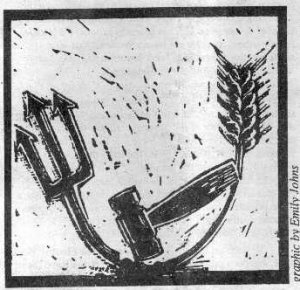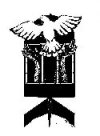



|
The campaign of nonviolent direct action to disarm Britain's Trident nuclear submarine fleet continues to spread. Yet another acquittal has exonerated and emboldened the resistance while related actions across Britain - such as the Jubilee Ploughshares 2000 - reveal the impact of Trident in more communities.
On January 18, a Manchester Crown Court jury returned a majority verdict
of not guilty for Sylvia Boyes and River. The two Trident Ploughshares
pledgers were charged with conspiracy to commit criminal damage in November,
1999, after being apprehended in the Barrow shipyard as they swam with
hand tools towards the HMS Vengeance. Over six days of testimony, the two
denied any symbolic intent to their action. Their only intent was to uphold
international law where the government had not, by beginning to rid Britain
of the illicit nuclear threat posed by Trident submarines. 
An international expert on nuclear disarmament told the court that direct action against nuclear weapons policy can be effective. Rebecca Johnson, a nuclear disarmament adviser to government officials worldwide, explained that she had campaigned at Greenham Common alongside Sylvia Boyes. Johnson said that she has since been told by U.S. Air Force personnel that the women's direct action there was an important reason for the withdrawal of cruise missiles from British soil.
Peace Studies Professor Rogers of Bradford University testified for the defense about evidence that Trident is not simply a defensive weapon, but has been specifically deployed as a threat in recent conflicts.
The acquittal came as two women who in February, 1999, actually hammered on the HMS Vengeance in the Barrow dock, return before the same court. Rosie James and Rachel Wenham, the "Aldermaston Women Trash Trident" duo, are set for retrial April 3 after earlier mistrials.
LORD ADVOCATE'S REFERENCE
In Scotland, the Crown has appealed a Greenock Sheriff's now notorious acquittal of three disarmers. Known as a Lord Advocate's Reference, the appeal to Scotland's High Court will not affect the verdict for Ellen Moxley, Ulla Roder, and Angie Zelter. It is only a review of the verdict's legal conclusions about Britain's nuclear force and acceptable citizen action. However, it would set precedent for future courts weighing the issues raised by the Trident Ploughshares campaign. The case as presented to the High Court, may be read at www.tridentploughshares.org/. A decision is expected in February.
Campaigners arrested at Faslane and Coulport now regularly appear in Helensburgh District Court, where some cases are dismissed, many people are fined and most are refusing to pay. On their way to court on October 25 regarding nonpayment of earlier fines, Marjan Willemsen and Zoe Weir cut through a fence at the Faslane base and climbed a light tower near one of the shipping berths. There they hung a banner reading "Trident Subs Threaten the World." Military police arrested then released the pair, who arrived in court that afternoon. Weir was given another seven days to pay, but Willemsen, a Dutch citizen, was jailed for several days. Weir reported to police on November 5, affirming her refusal to pay, and was then jailed for seven days instead.
The Trident Ploughshares campaign held its November quarterly gathering
at the Aldermaston Nuclear Weapons Establishment in the south of England.
There, the nuclear weapons deployed on Trident are fashioned.

As campaigners gathered near Aldermaston on November 11, Remembrance Day, four Citizen Weapons Inspectors - including three retired schoolteachers - were arrested after cutting their way into the establishment. Their statement explained, "We are doing this on Remembrance Day because the existence of Atomic Weapons Establishment Aldermaston makes a mockery of the mourning for all those killed in wars and the hopes for peace being expressed today." In Scotland, two more campaigners were arrested as they cut into the Faslane base.
Two days later, while a large police force prepared for a big blockade that never came at Aldermaston, Faslane was shut down at two gates by a blockade and tripods. Six more were arrested. In Helensburgh District Court, Ian Thompson was jailed seven days for nonpayment of fines.
Back in the south of England, self-professed Nuclear Decommissioner Roger Franklin was threatened with 28 days in jail if he did not begin paying £721 in penalties - at £15/week - for his criminalized work at Aldermaston and Coulport. When the offer of his fence-cutting skills as community service was rejected by the court, the pensioner initiated Franklin's Freedom to Decommission Fund. "I am willing to go to prison rather than pay the... penalties imposed for my decommissioning work... However, if the threat of my imprisonment could help Trident Ploughshares with its funding, that would be different."
Franklin asked supporters not already pledged to resistance with the Trident Ploughshares campaign to send him £15 checks, only one per person, made payable to the court. For each such check Franklin forwards to the court, he will contribute £15 to the Trident Ploughshares office. Any surplus checks will be returned to sender with the suggestion that the funds be forwarded to Trident Ploughshares. Franklin remains free on such donations.

On November 28, retired Northumbrian teachers Joy Mitchell and Joan Meredith faced trial in Helensburgh on two charges from the August, 1999 demo at Coulport. Mitchell asked the court "how we could teach our children to uphold the law when their own country so flagrantly breached it?" Meredith proclaimed, "I will not sit at home knitting, pretending that it's all right when it's all wrong!" Both were fined £50, which they refused to pay. Mitchell was then jailed seven days for another unpaid fine.
On December 6, Clive Fudge was found not guilty of breach of the peace at the November 1999 blockade at Coulport, but like Mitchell was then jailed seven days for another unpaid fine.
Scottish Member of Parliament Tommy Sheridan made news December 17, when he went to jail for the unpaid fine from his February, 2000 arrest at Faslane. Due to Christmas, Sheridan was released December 22.
On December 18, Ulla Roder, one of the acquitted defendants in the case now before the High Court, cut her way into the Faslane base only to be thwarted by faulty bolt-cutters as she snipped at an inner security fence. She spent several hours inside the base before being arrested, cited and released. Roder and Ian Thompson were again arrested January 19, the day after the Manchester acquittal, as they attempted to cut their way into the Coulport base.
Their arrests brought to 786 the total number reported since the campaign began in 1998. One hundred and seventy two people from 15 countries have pledged to take part in the campaign. Nearly 100 trials have taken place, with many more still scheduled.There have been 893 days spent in prison, excluding time in police cells, and the fines total stands at £12,661.
For more information, contact Trident Ploughshares, 42-46 Bethel St., Norwich, Norfolk, NR2 1NR, England, phone 01603 469 296, email: tp2000@gn.apc.org, web: www.gn.apc.org/tp2000.
